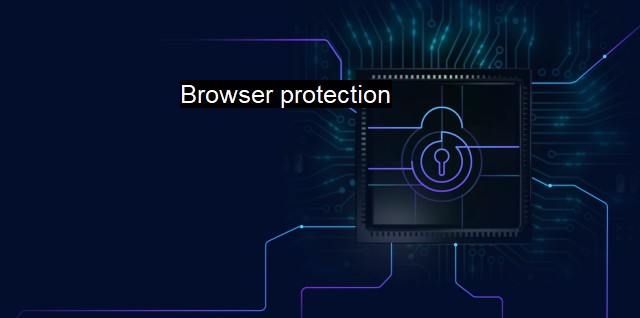What is Browser protection?
Why Browser Protection is Essential: Safeguarding Against Malware, Viruses, and Other Online Dangers
Browser protection, in the context of cybersecurity and antivirus mechanisms, is an additional layer of security intended to safeguard internet users from various Web-based threats. It is prevalent due to the increased use of the internet for various functions such as online shopping, banking, education, work, to mention some, thus necessitating the need to prevent unauthorized access, malicious attacks, manipulation of data, data theft, and other cyber threats. Given that browsers are primarily our gateways to the Internet, they yield the first line of defense against these cyber threats, therefore making browser protection vital.Browser protection operates by scanning the websites you visit in real time, subsequently examining the site's reputation and checking it against whitelists and blacklists of known secure and malicious sites respectively. It also checks the site's security setup to ensure it aligns with protocol even before you click on it. Browser protection measures can provide alerts or block any suspicious activity or exploitable vulnerabilities, all while causing minimal delay to your browsing.
Browser protection also plays a critical role in integrating effective antivirus solutions to block unwanted pop-ups, advertisements, and the automatic downloading of unwanted software or malware. This protection has a function of preventing redirection to phishing sites, which criminals often design to look like popular web services to trick users into providing login details and personal information.
Browser-based threats include aspects such as privacy invasion, wherein certain sites or cookies collect your data without prior consent, or malware wherein harmful software infiltrates your system to cause widespread damage. Unwanted software and phishing also come under the umbrella of browser threats. Unwanted software refers to instances where harmful or unnecessary software is unknowingly downloaded, where it can in turn, subject the user to cyber vulnerabilities. Phishing, meanwhile, tricks internet users into divulging sensitive details which can be leveraged for financial gain or complete identity theft.
Therefore, it's crucial to have browser protection in place to counter these threats. It prevents your personal data from falling into unauthorized hands. Password managers and effective anti-tracking measures work to further safeguard privacy. Script blocking will thwart any chances of unverified and harmful scripts from running. It applies to third-party scripts often synonymous with data breaches.
Complete browser protection also includes antivirus protection and firewalls. Antivirus software is a key, comprehensive protection measure that safeguards your system from various types of malware while identifying and eliminating them. Firewalls limit the access to your network by checking data and blocking unwanted traffic, thereby preventing browser-hijacking and other network-centric cyber crusades, providing a secure browsing environment.
Admittedly, cyber threats are evolving daily, courtesy of enablers such as advanced technology, Brilliant brains with ill intent, and an increased digital presence. The challenges cannot be spirituality afford by only implementing browser protection. A balanced approach emphasizing updating browsers and antivirus software regularly, and being aware of strange site behavior can really help to plug this gap.
In addition to these technical countermeasures, user education on topics such as secure URL schemes (https://) and how attackers use social engineering to trick victims into downloading harmful content is also crucial for full-circle browser protection.
Browser protection is all about keeping web users safe from manipulation, unauthorized access, theft, data breaches, and general cyber threats. It utilizes proactive measures, blacklist checks, and site reputation verification to secure your digital existence. Therefore, investing in an excellent browser protection suite and understanding safe browsing habits will minimize the risk and offer some much-needed peace of mind.

Browser protection FAQs
What is browser protection?
Browser protection is a feature of cybersecurity and antivirus software that helps safeguard your web browser against online threats such as malware, phishing attacks, and dangerous websites. It detects and blocks malicious code from running in your browser, thereby protecting your device and personal information.What are some common types of online threats that browser protection can help prevent?
Browser protection can help prevent various types of online threats like malware, spyware, adware, ransomware, phishing, and identity theft. It scans websites for malicious code, blocks suspicious downloads, and warns you about potentially dangerous sites.How can I enable browser protection on my device?
Enabling browser protection depends on the antivirus or cybersecurity software you're using. Most popular antivirus software like Norton, McAfee, and Avira offer browser protection features that can be easily enabled from the settings menu. Ensure your antivirus software is up-to-date and has the latest browser protection features.Is browser protection necessary?
Yes, browser protection is essential for anyone who uses the internet as it shields you from a wide range of online threats. There are several cybersecurity risks that can compromise your personal and financial data through your web browser. Hence, it's advisable to have an antivirus program with a robust browser protection feature to stay secure online.| | A | | | B | | | C | | | D | | | E | | | F | | | G | | | H | | | I | | | J | | | K | | | L | | | M | |
| | N | | | O | | | P | | | Q | | | R | | | S | | | T | | | U | | | V | | | W | | | X | | | Y | | | Z | |
| | 1 | | | 2 | | | 3 | | | 4 | | | 7 | | | 8 | | |||||||